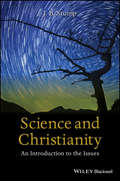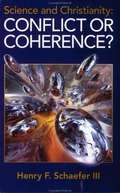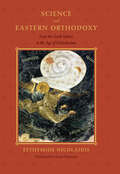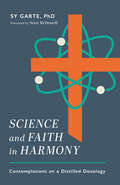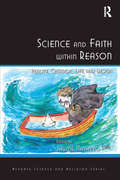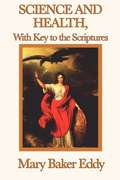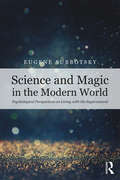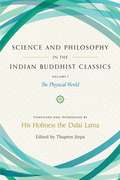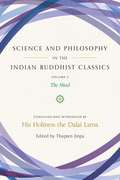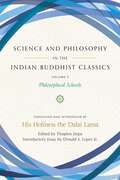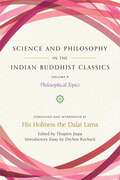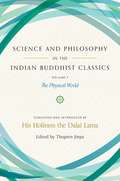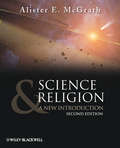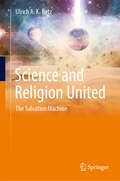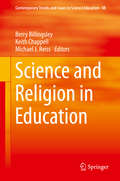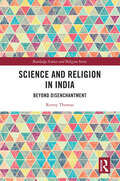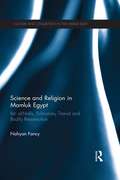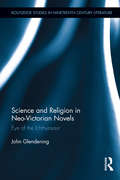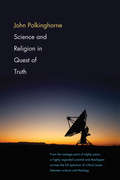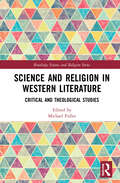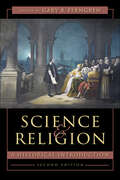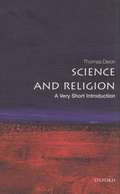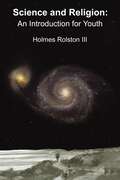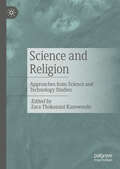- Table View
- List View
Science and Christianity: An Introduction to the Issues
by J. B. StumpScience and Christianity is an accessible, engaging introduction to topics at the intersection of science and Christian theology. A philosophically orientated treatment that introduces the relationship of science to Christianity and explores to what extent the findings of science affect traditional Christian theology Addresses important theological topics in light of contemporary science, including divine action, the problem of natural evil, and eschatology Historically oriented chapters and chapters covering methodological principles for both science and theology provide the reader with a strong foundational understanding of the issues Includes feature boxes highlighting quotations, biographies of major scientists and theologians, key terms, and other helpful information Issues are presented as fairly and objectively as possible, with strengths and weaknesses of particular interpretations fully discussed
Science and Christianity: Conflict or Coherence?
by Henry F. SchaeferA science professor clearly and simply writes a series of lectures bringing together science and Christianity. This is a fascinating book.
Science and Eastern Orthodoxy: From the Greek Fathers to the Age of Globalization (Medicine, Science, and Religion in Historical Context)
by Efthymios NicolaidisPeople have pondered conflicts between science and religion since at least the time of Christ. The millennia-long debate is well documented in the literature in the history and philosophy of science and religion in Western civilization. Science and Eastern Orthodoxy is a departure from that vast body of work, providing the first general overview of the relationship between science and Christian Orthodoxy, the official church of the Oriental Roman Empire. This pioneering study traces a rich history over an impressive span of time, from Saint Basil’s Hexameron of the fourth century to the globalization of scientific debates in the twentieth century. Efthymios Nicolaidis argues that conflicts between science and Greek Orthodoxy—when they existed—were not science versus Christianity but rather ecclesiastical debates that traversed the whole of society. Nicolaidis explains that during the Byzantine period, the Greek fathers of the church and their Byzantine followers wrestled passionately with how to reconcile their religious beliefs with the pagan science of their ancient ancestors. What, they repeatedly asked, should be the church’s official attitude toward secular knowledge? From the rise of the Ottoman Empire in the fifteenth century to its dismantling in the nineteenth century, the patriarchate of Constantinople attempted to control the scientific education of its Christian subjects, an effort complicated by the introduction of European science in the seventeenth and eighteenth centuries. Science and Eastern Orthodoxy provides a wealth of new information concerning Orthodoxy and secular knowledge—and the reactions of the Orthodox Church to modern sciences.
Science and Faith in Harmony: Contemplations on a Distilled Doxology
by Sy GarteRather than discord between science and Christian faith, there is a harmony as grand as any choral masterpiece The idea that Christianity and science are inextricably in conflict is a relatively recent conception. However, with each new scientific discovery and scriptural insight, it's an idea that's being proved to be insupportable. Sy Garte has immersed himself in both science and faith and knows they work beautifully together to sing of the greatness of God. Now this respected scientist shares how God's world (nature and science) and God's word (made flesh in Christ) are bound together in loving harmony. In Science and Faith in Harmony, Garte examines modern scientific concepts and what they can teach us about theological truths, such as the dual nature of Christ. He explores the ways in which the terminology and language of science and faith consistently match each other. Despite his deep dives into theology and science, Garte does not get overly technical in his writing. Instead, he is personal and passionate, speaking directly to readers with a tone of joy and wonder, inviting them to join the chorus of praise to the Lord. Readers still wondering whether the truths of science and Christian faith are in conflict need this book. Following the path of Christ and holding a scientific worldview at the same time is not only possible but also leads to a fuller, richer life of harmony and truth.
Science and Faith within Reason: Reality, Creation, Life and Design (Ashgate Science And Religion Ser.)
by Jaume NavarroScientists, historians, philosophers and theologians often engage in debates on the limitations and mutual interactions of their respective fields of study. Serious discussions are often overshadowed by the mass-produced popular and semi-popular literature on science and religion, as well as by the political agendas of many of the actors in these debates. For some, reducing religion and science to forms of social discourse is a possible way out from epistemological overlapping between them; yet is there room for religious faith only when science dissolves into one form of social discourse? The religion thus rescued would have neither rational legitimisation nor metaphysical validity, but if both scientific and religious theories try to make absolute claims on all possible aspects of reality then conflict between them seems almost inevitable. In this book leading authors in the field of science and religion, including William Carroll, Steve Fuller, Karl Giberson and Roger Trigg, highlight the oft-neglected and profound philosophical foundations that underlie some of the most frequent questions at the boundary between science and religion: the reality of knowledge, and the notions of creation, life and design. In tune with Mariano Artigas’s work, the authors emphasise that these are neither religious nor scientific but serious philosophical questions.
Science and Health, with Key to the Scriptures
by Mary Baker EddyScience and Health with Key to the Scriptures is the central text of the Christian Science religion. It was written by Mary Baker Eddy, inspired by studies of the Bible she undertook in 1867 following a healing experience. Science and Health posits a wholly metaphysical view of Christianity in which sin, disease, and death are not of God, and are therefore not real. Further, it suggests that by striving toward a spiritual understanding of the world as God's perfect creation, these "false beliefs" are shed from one's experience.
Science and Magic in the Modern World: Psychological Perspectives on Living with the Supernatural
by Eugene V. SubbotskyScience and Magic in the Modern World is a unique text that explores the role of magical thinking in everyday life. It provides an excellent psychological look at the subconscious belief in magic in both popular culture and society, as well as experimental research that considers human consciousness as a derivative of belief in the supernatural, thus showing that our feelings, emotions, attitudes and other psychological processes follow the laws of magic. This book synthesises the science of ‘natural’ phenomena and the magic of the ‘supernatural’ to present an interesting look at the juxtaposition of the inner and outer selves. Fusing research into psychological disorders, subconscious feelings, as well as the rising presence of artificial intelligence, this book demonstrates how an engagement with magical thinking can enhance one’s creativity and cognitive skills. Science and Magic in the Modern World is an invaluable resource for those studying consciousness, as well as those looking at the effect of magical thinking on religion, politics, science and society.
Science and Philosophy in the Indian Buddhist Classics
by His Holiness the Dalai LamaExplore the nature of our material world in a unique sourcebook, conceived by the Dalai Lama, collecting the scientific observations found in classical Buddhist treatises. Under the visionary supervision of His Holiness the Dalai Lama, Science and Philosophy in the Indian Buddhist Classics brings together classical Buddhist explorations of the nature of our material world and the human mind and puts them into context for the modern reader. It is the Dalai Lama’s view that the explorations by the great masters of northern India in the first millennium CE still have much that is of interest today, whether we are Buddhist or not. Volume 1, The Physical World, explores of the nature of our material world—from the macroscopic to the microscopic. It begins with an overview of the many frameworks, such as the so-called five aggregates, that Buddhist thinkers have used to examine the nature and scope of reality. Topics include sources of knowledge, the scope of reason, the nature and constituents of the material world, theories of the atom, the nature of time, the formation of the universe, and the evolution of life, including a detailed explanation of the early Buddhist theories on fetal development. The volume even contains a brief presentation on early theories about the structure and function of the brain and the role of microorganisms inside the human body. The book weaves together passages from the works of great Buddhist thinkers like Asanga, Vasubandhu, Nagarjuna, Dignaga, and Dharmakirti. Each of the major topics is introduced by Thupten Jinpa, the Dalai Lama’s principal English-language translator and founder of the Institute of Tibetan Classics.
Science and Philosophy in the Indian Buddhist Classics, Vol. 2: The Mind (Science and Philosophy in the Indian Bud #2)
by His Holiness the Dalai Lama John D. DunneThe second volume in a prominent new series on Buddhism and science, directed by the Dalai Lama and previously covered by the BBC.Science and Philosophy in the Indian Buddhist Classics compiles classical Buddhist explorations of the nature of our material world, the human mind, logic, and phenomenology and puts them into context for the modern reader. This ambitious four-volume series—a major resource for the history of ideas and especially the history of science and philosophy—has been conceived by and compiled under the visionary supervision of His Holiness the Dalai Lama himself. It is his view that the exploratory thinking of great Indian masters in the first millennium CE still has much that is of interest to us today, whether we are Buddhist or not. These volumes make those insights accessible. This, the second volume in the series, focuses on the science of the mind. Readers are first introduced to Buddhist conceptions of mind and consciousness and then led through traditional presentations of mental phenomena to reveal a Buddhist vision of the inner world with fascinating implications for the contemporary disciplines of cognitive science, psychology, emotion research, and philosophy of mind. Major topics include: -The distinction between sensory and conceptual processes and the pan-Indian notion of mental consciousness -Mental factors—specific mental states such as attention, mindfulness, and compassion—and how they relate to one another -The unique tantric theory of subtle levels of consciousness, their connection to the subtle energies, or &“winds,&” that flow through channels in the human body, and what happens to each when the body and mind dissolve at the time of death -The seven types of mental states and how they impact the process of perception -Styles of reasoning, which Buddhists understand as a valid avenue for acquiring sound knowledge In the final section, the volume offers what might be called Buddhist contemplative science, a presentation of the classical Buddhist understanding of the psychology behind meditation and other forms of mental training. To present these specific ideas and their rationale, the volume weaves together passages from the works of great Buddhist thinkers like Asanga, Vasubandhu, Nagarjuna, Dignaga, and Dharmakirti. His Holiness the Dalai Lama&’s introduction outlines scientific and philosophical thinking in the history of the Buddhist tradition. To provide additional context for Western readers, each of the six major topics is introduced with an essay by John D. Dunne, distinguished professor of Buddhist philosophy and contemplative practice at the University of Wisconsin. These essays connect the traditional material to contemporary debates and Western parallels, and provide helpful suggestions for further reading.
Science and Philosophy in the Indian Buddhist Classics, Vol. 3: Philosophical Schools
by His Holiness Dalai LamaDeepen your understanding of meaning and truth with the third volume of the Dalai Lama&’s esteemed series Science and Philosophy in the Indian Buddhist Classics.Science and Philosophy in the Indian Buddhist Classics compiles classical Buddhist explorations of the nature of the material world, the human mind, reason, and liberation, and puts them into context for the modern reader. This ambitious four-volume series—a major resource for the history of ideas and especially the history of science and philosophy—has been conceived by and compiled under the visionary supervision of His Holiness the Dalai Lama himself. It is his view that the exploratory thinking of the great masters of classical India still has much that is of interest to us today, whether we are Buddhist or not. These volumes make those insights accessible. In this third volume the focus turns to exploring the philosophical schools of India. The practice of presenting the views of various schools of philosophy dates back to the first millennium in India, when proponents of competing traditions would arrange the diverse sets of philosophical positions in a hierarchy culminating in their own school&’s superior tenets. Centuries later, relying on the Indian Buddhist treatises, Tibet developed its own tradition of works on tenets (grub mtha&’), often centered on the four schools of Buddhist philosophy, using them to demonstrate the philosophical evolution within their own tradition, and within individual practitioners, as they progressed through increasingly more subtle expressions of the true reality. The present work follows in this venerable tradition, but with a modern twist. Like its predecessors, it presents the views of seven non-Buddhist schools, those of the Samkhya, Vaisesika, Nyaya, Mimamsa, Vedanta, Jaina, and Lokayata, followed by the Buddhist Vaibhasika, Sautrantika, Cittamatra, and Madhyamaka schools, arranging them like steps on a ladder to the profound. But rather than following in the sharply polemical approach of its ancient predecessors, it strives to survey each tradition authentically, relying on and citing the texts sacred to each, allowing the different traditions to speak for themselves. What, it asks, are the basic components of the world we experience? What is the nature of their ultimate reality? And how can we come to experience that for ourselves? See how the rich spiritual traditions of India approached these key questions, where they agreed, and how they evolved through dialogue and debate. This presentation of philosophical schools is introduced by His Holiness and is accompanied by an extensive introduction and survey by Professor Donald Lopez Jr. of the University of Michigan, who is uniquely qualified to communicate the scope and significance of this literary and spiritual heritage to modern readers.
Science and Philosophy in the Indian Buddhist Classics, Vol. 4: Philosophical Topics
by His Holiness the Dalai LamaThis fourth and final Science and Philosophy in the Indian Buddhist Classics volume provides, through extensive passages, a window into the works of the great thinkers from the flowering of philosophy in classical India.This is the second philosophy volume in the Science and Philosophy series. Whereas the first philosophy volume presented the views of the non-Buddhist and Buddhist schools in sequence, the present work selects specific topics for consideration, including the nature of the two truths, the analysis of self, the Yogacara explanation of reality, emptiness in the Madhyamaka tradition, a survey of logic and epistemology, and the Buddhist explanation of language and meaning. Like earlier volumes, it provides, through extensive extracts, a window into the works of the masters of the Nalanda tradition. The final section on language is particularly unique and largely crafted by Thupten Jinpa.
Science and Philosophy in the Indian Buddhist Classics: The Physical World
by Thupten Jinpa His Holiness the Dalai Lama Ian CoghlanExplore the nature of our material world in a unique sourcebook, conceived by the Dalai Lama, collecting the scientific observations found in classical Buddhist treatises. Under the visionary supervision of His Holiness the Dalai Lama, Science and Philosophy in the Indian Buddhist Classics brings together classical Buddhist explorations of the nature of our material world and the human mind and puts them into context for the modern reader. It is the Dalai Lama’s view that the explorations by the great masters of northern India in the first millennium CE still have much that is of interest today, whether we are Buddhist or not. Volume 1, The Physical World, explores of the nature of our material world—from the macroscopic to the microscopic. It begins with an overview of the many frameworks, such as the so-called five aggregates, that Buddhist thinkers have used to examine the nature and scope of reality. Topics include sources of knowledge, the scope of reason, the nature and constituents of the material world, theories of the atom, the nature of time, the formation of the universe, and the evolution of life, including a detailed explanation of the early Buddhist theories on fetal development. The volume even contains a brief presentation on early theories about the structure and function of the brain and the role of microorganisms inside the human body. The book weaves together passages from the works of great Buddhist thinkers like Asanga, Vasubandhu, Nagarjuna, Dignaga, and Dharmakirti. Each of the major topics is introduced by Thupten Jinpa, the Dalai Lama’s principal English-language translator and founder of the Institute of Tibetan Classics.
Science and Religion
by Alister E. McgrathNow thoroughly updated to reflect the latest debates, this popular textbook introduces readers to the central questions in the field of science and religion. Ideally suited to those who have little or no prior knowledge in either area, it incorporates numerous student-friendly features, including maps, summaries, and historical references, resulting in the most up-to-date introduction to the study of religion and the natural sciences available.Examines the historical, theological, philosophical and scientific aspects of the interaction between religion and scienceFully updated to reflect current, cutting-edge debates on scientific atheism and the limits of scientific method, and discussions about the relationship between science and religion in major world faithsIncludes a historical component to enable readers to orientate themselves within the subjectTakes a topic based approach which fits into the existing structure of most courses, and includes explanatory material not found in other works of this kind, making it highly accessible for those with little scientific or religious background knowledgeIncorporates illustrations, tables, maps, summaries and questions for a lively and engaging approach to the subjectWritten by world-renowned theologian, Alister McGrath; author of bestselling books such as Dawkins' God, and an acknowledged expert in the field of science and religion
Science and Religion
by John Hedley BrookeThe past quarter-century has seen an explosion of interest in the history of science and religion. But all too often the scholars writing it have focused their attention almost exclusively on the Christian experience, with only passing reference to other traditions of both science and faith. At a time when religious ignorance and misunderstanding have lethal consequences, such provincialism must be avoided and, in this pioneering effort to explore the historical relations of what we now call "science" and "religion," the authors go beyond the Abrahamic traditions to examine the way nature has been understood and manipulated in regions as diverse as ancient China, India, and sub-Saharan Africa. Science and Religion around the World also provides authoritative discussions of science in Judaism, Christianity, and Islam -- as well as an exploration of the relationship between science and the loss of religious beliefs. The narratives included in this book demonstrate the value of plural perspectives and of the importance of location for the construction and perception of science-religion relations.
Science and Religion United: The Salvation Machine
by Ulrich A. BetzThis book offers a fresh perspective on how science and religion are connected, and how prayer aligns with the laws of nature. It explores a holistic worldview where science and religion complement each other, shedding light on life, society, and philosophical and societal concerns. We are born into a world full of mysteries that we only partially understand. We don’t know where we are coming from, we don’t know why we live, and we don’t know where we will go. We don’t know how everything started; we even don’t know what “everything” really is. We are living in an era of rapid change marked by disruptive technologies, like artificial intelligence and computers. Combined with a perception that the old wisdom transferred to us by religion is outdated, traditional values and institutions that had worth and power over many centuries are now losing their appeal. Science has made remarkable progress but can't answer life's most profound questions about our origins, purpose, and destination – why do we live and what should we do? In this book, the author begins with an overview of science, our understanding of the universe, highlighting gaps in our knowledge, like what started the Big Bang, followed by examples of successful scientific achievements and insights into the limits of science. In the subsequent chapters, the author examines topics such as mind over matter and the coexistence of evolution, creation, natural laws, and miracles. An attempt to answer the theodicy question is also provided in this book, where the author connects new scientific discoveries with ancient religious wisdom. The book concludes with a chapter devoted to innovation and a call for building a better world. This book is a compelling read for scholars, professionals, and curious laymen alike, ready to expand their horizons.
Science and Religion in Education (Contemporary Trends and Issues in Science Education #48)
by Michael J. Reiss Berry Billingsley Keith ChappellThis book brings together the latest research in education in relation to science and religion. Leading international scholars and practitioners provide vital insights into the underlying debates and present a range of practical approaches for teaching. Key themes include the origin of the universe, the theory of evolution, the nature of the human person, the nature of science and Artificial Intelligence. These are explored in a range of international contexts. The book provides a valuable resource for teachers, students and researchers in the fields of education, science, religious education and the growing specialist field of science and religion.Science and Religion in Education is a compelling read for current and future generations of academic researchers and teachers who wish to explore the fascinating intersect between science education and religious studies. The research findings and insights presented by these international scholars offer new dimensions on contemporary practice. - Vaille Dawson, Professor of Science Education, University of Western AustraliaScience and Religion in Education offers a fascinating and diverse collection of chapters surveying the current state of thinking about how science and religion can be understood in education. The book offers a wealth of thought-provoking material for anyone interested in the natures of science and religion, their relationship(s), or their representation within the curriculum. - Professor Keith Taber, University of CambridgeScience education and religious education are uncomfortable bedfellows. This book, written in part as a response to the – perhaps too clear – accounts of Ian Barbour, provides suitably nuanced pictures of how science and religion are dealt with in schools. Whatever the views of specialists, young people ‘receive’ an education in both science and religion: hearing their voices is refreshing in such a serious academic account. - Julian Stern, Professor of Education and Religion, York St John UniversityHumans have long endeavored to make sense of the world often using science and religion. Yet, these two great traditions are frequently seen as incompatible. This useful volume features thoughtful contributions from experts whose work straddles the divide and provides educators with arguments, engaging strategies and historical perspectives to help build a bridge and allow a fruitful discussion in schools. - William F. McComas, Distinguished Professor of Science Education, University of ArkansasEqual parts critical examination of existing models for the relationship between science and religion, scholarly exposition of newer models, and insights toward practical application in classrooms, this book is an invaluable resource for science and religion educators. If you have been thinking it is time we looked beyond Barbour’s taxonomy, you will want to read this book. If you have not, I implore you to read this book. - Jason Wiles, Associate Professor of Biology and Science Education, Syracuse University
Science and Religion in India: Beyond Disenchantment (Routledge Science and Religion Series)
by Renny ThomasThis book provides an in-depth ethnographic study of science and religion in the context of South Asia, giving voice to Indian scientists and shedding valuable light on their engagement with religion. Drawing on biographical, autobiographical, historical, and ethnographic material, the volume focuses on scientists’ religious life and practices, and the variety of ways in which they express them. Renny Thomas challenges the idea that science and religion in India are naturally connected and argues that the discussion has to go beyond binary models of ‘conflict’ and ‘complementarity’. By complicating the understanding of science and religion in India, the book engages with new ways of looking at these categories.
Science and Religion in Mamluk Egypt: Ibn al-Nafis, Pulmonary Transit and Bodily Resurrection (Culture and Civilization in the Middle East)
by Nahyan FancyThe discovery of the pulmonary transit of blood was a ground-breaking discovery in the history of the life sciences, and a prerequisite for William Harvey’s fully developed theory of blood circulation three centuries later. This book is the first attempt at understanding Ibn al-Nafīs’s anatomical discovery from within the medical and theological works of this thirteenth century physician-jurist, and his broader social, religious and intellectual contexts. Although Ibn al-Nafīs did not posit a theory of blood circulation, he nevertheless challenged the reigning Galenic and Avicennian physiological theories, and the then prevailing anatomical understandings of the heart. Far from being a happy guess, Ibn al-Nafīs’s anatomical result is rooted in an extensive re-evaluation of the reigning medical theories. Moreover, this book shows that Ibn al-Nafīs’s re-evaluation is itself a result of his engagement with post-Avicennian debates on the relationship between reason and revelation, and the rationality of traditionalist beliefs, such as bodily resurrection. Breaking new ground by showing how medicine, philosophy and theology were intertwined in the intellectual fabric of pre-modern Islamic societies, Science and Religion in Mamluk Egypt will be of interest to students and scholars of the History of Science, the History of Medicine and Islamic Studies.
Science and Religion in Neo-Victorian Novels: Eye of the Ichthyosaur (Routledge Studies in Nineteenth Century Literature)
by John GlendeningCriticism about the neo-Victorian novel — a genre of historical fiction that re-imagines aspects of the Victorian world from present-day perspectives — has expanded rapidly in the last fifteen years but given little attention to the engagement between science and religion. Of great interest to Victorians, this subject often appears in neo-Victorian novels including those by such well-known authors as John Fowles, A. S. Byatt, Graham Swift, and Mathew Kneale. This book discusses novels in which nineteenth-century science, including geology, paleontology, and evolutionary theory, interacts with religion through accommodations, conflicts, and crises of faith. In general, these texts abandon conventional religion but retain the ethical connectedness and celebration of life associated with spirituality at its best. Registering the growth of nineteenth-century secularism and drawing on aspects of the romantic tradition and ecological thinking, they honor the natural world without imagining that it exists for humans or functions in reference to human values. In particular, they enact a form of wonderment: the capacity of the mind to make sense of, creatively adapt, and enjoy the world out of which it has evolved — in short, to endow it with meaning. Protagonists who come to experience reality in this expansive way release themselves from self-anxiety and alienation. In this book, Glendening shows how, by intermixing past and present, fact and fiction, neo-Victorian narratives, with a few instructive exceptions, manifest this pattern.
Science and Religion in Quest of Truth
by John PolkinghorneJohn Polkinghorne, an international figure known both for his contributions to the field of theoretical elementary particle physics and for his work as a theologian, has over the years filled a bookshelf with writings devoted to specific topics in science and religion. In this new book, he undertakes for the first time a survey of all the major issues at the intersection of science and religion, concentrating on what he considers the essential insights for each. Clearly and without assuming prior knowledge, he addresses causality, cosmology, evolution, consciousness, natural theology, divine providence, revelation, and scripture. Each chapter also provides references to his other books in which more detailed treatments of specific issues can be found. For those who are new to what Polkinghorne calls "one of the most significant interdisciplinary interactions of our time," this volume serves as an excellent introduction. For readers already familiar with John Polkinghorne's books, this latest is a welcome reminder of the breadth of his thought and the subtlety of his approach in the quest for truthful understanding.
Science and Religion in Western Literature: Critical and Theological Studies (Routledge Science and Religion Series)
by Michael FullerThis book explores ways in which Western literature has engaged with themes found within the field of science and religion, both historically and in the present day. It focuses on works of the imagination as important locations at which human arguments, hopes and fears may be played out. The chapters examine a variety of instances where scientific and religious ideas are engaged by novelists, poets and dramatists, casting new light upon those ideas and suggesting constructive ways in which science and religion may interact. The contributors cover a rich variety of authors, including Mary Shelley, Aldous Huxley, R. S. Thomas, Philip Pullman and Margaret Atwood. Together they form a fascinating set of reflections on some of the significant issues encountered within the discourse of science and religion, indicating ways in which the insights of creative artists can make a valuable and important contribution to that discourse.
Science and Religion: A Historical Introduction
by Gary B. FerngrenAn essential examination of the historical relationship between science and religion.Since its publication in 2002, Science and Religion has proven to be a widely admired survey of the complex relationship of Western religious traditions to science from the beginning of the Christian era to the late twentieth century. In the second edition, eleven new essays expand the scope and enhance the analysis of this enduringly popular book.Tracing the rise of science from its birth in the medieval West through the scientific revolution, the contributors here assess historical changes in scientific understanding brought about by transformations in physics, anthropology, and the neurosciences and major shifts marked by the discoveries of Copernicus, Galileo, Isaac Newton, Charles Darwin, and others. In seeking to appreciate the intersection of scientific discovery and the responses of religious groups, contributors also explore the theological implications of contemporary science and evaluate approaches such as the Bible in science and the modern synthesis in evolution, which are at the center of debates in the historiography, understanding, and application of science.The second edition provides chapters that have been revised to reflect current scholarship along with new chapters that bring fresh perspectives on a diverse range of topics, including new scientific approaches and disciplines and non-Christian traditions such as Judaism, Islam, Asiatic religions, and atheism. This indispensible classroom guide is now more useful than ever before.Contributors: Richard J. Blackwell, Peter J. Bowler, John Hedley Brooke, Glen M. Cooper, Edward B. Davis, Alnoor Dhanani, Diarmid A. Finnegan, Noah Efron, Owen Gingerich, Edward Grant, Steven J. Harris, Matthew S. Hedstrom, John Henry, Peter M. Hess, Edward J. Larsen, Timothy Larson, David C. Lindberg, David N. Livingstone, Craig Martin, Craig Sean McConnell, James Moore, Joshua M. Moritz, Mark A. Noll, Ronald L. Numbers, Richard Olson, Christopher M. Rios, Nicolaas A. Rupke, Michael H. Shank, Stephen David Snobelen, John Stenhouse, Peter J. Susalla, Mariusz Tabaczek, Alan C. Weissenbacher, Stephen P. Weldon, and Tomoko Yoshida
Science and Religion: A Very Short Introduction
by Thomas DixonThe debate between science and religion is never out of the news: emotions run high, fueled by polemical bestsellers like The God Delusion and, at the other end of the spectrum, high-profile campaigns to teach "Intelligent Design" in schools. Yet there is much more to the debate than the clash of these extremes. As Thomas Dixon shows in this balanced and thought-provoking introduction, a whole range of views, subtle arguments, and fascinating perspectives can be found on this complex and centuries-old subject. He explores the key philosophical questions that underlie the debate, but also highlights the social, political, and ethical contexts that have made the tensions between science and religion such a fraught and interesting topic in the modern world. Dixon emphasizes how the modern conflict between evolution and creationism is quintessentially an American phenomenon, arising from the culture and history of the United States, as exemplified through the ongoing debates about how to interpret the First-Amendment's separation of church and state. Along the way, he examines landmark historical episodes such as the Galileo affair, Charles Darwin's own religious and scientific odyssey, the Scopes "Monkey Trial" in Tennessee in 1925, and the Dover Area School Board case of 2005, and includes perspectives from non-Christian religions and examples from across the physical, biological, and social sciences.
Science and Religion: An Introduction for Youth
by Holmes Rolston IIIThis is written for young people, grades 9-12, to read on their own, with others their age, as well as with parents and teachers.How is the scientific method similar to and different from the way that Christians think? One tends to see what one is looking for. Those who think about religion also use such frameworks. They may call them creeds. Both science and religion open up "big questions." Scientists seek causes; believers seek meanings.The origin and creation of the universe displays some surprising features. Physicists have found dramatic connections between astronomical and atomic scales that combine to make the Earth and its life possible. The mid-range scales where the most complex things are found depend on the interacting microscopic and astronomical ranges. The universe is "user-friendly."Scientific concepts of the origin of life are very different from the Genesis creation stories. Genetics is about creating, storing, elaborating information. The Genesis stories are a parable that reveals the meaning of creation. Biological science does discover a wonderland Earth. The Genesis parable affirms a land of promise, today an Earth with promise.The human mind is the most complex thing in the known universe. How much science of persons can psychologists have? Neuroscience has discovered remarkably plastic, flexible minds. Resolute behavior, especially in youth, re-shapes our minds. Humans have huge cognitive power gained by speech and language. Jesus teaches us to love God and neighbor. The two great commandments are not the facts of any science.The knowledge and wisdom of past and present transmitted to the future in cultures is as important as what we inherit genetically. How are youth shaped by their rearing, by their peer groups? How do people behave socially in groups: government, politics, churches, economics, and business? Also, evaluating ethical responsibilities for love and justice demands religious and philosophical judgments.Contemporary scientists have added a new science. What of artificial intelligence, of massive computing power? This aids science, makes possible new discoveries. Youth have pages on Facebook. They twitter. How will this behavior affect their adult character? Youth hear a lot about STEM - science, technology, engineering, math. Youth need faith and ethics to evaluate the values in STEM.Natural and cultural histories require searching for meanings. History is more narrative, the stories of personal life that shape history: Abraham, Muhammad, Jesus, Martin Luther, Martin Luther King, Israel, England, America, and the Second World War Youth today will write the history of this first century of the new millennium, with challenges as painful as ever. To do that with justice and love, they need the wisdom of the Christian faith. XX
Science and Religion: Approaches from Science and Technology Studies
by Zara Thokozani KamwendoThis edited volume offers new and exciting perspectives on the social study of science and religion through current scholarship grounded in Science and Technology Studies (STS). The contributors explore how STS theories, methods, and concepts can be applied to the study of religion, as well as how to incorporate aspects of religion into STS. The purpose of the volume is to advance the social study of science and religion by fostering the already interdisciplinary nature of the field and to encourage engagement with the intersection between science and religion from a wide range of perspectives.
